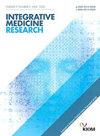多囊卵巢综合征超重的观点和饮食管理:传统印度医学临床医生的焦点小组研究
IF 3
4区 医学
Q2 INTEGRATIVE & COMPLEMENTARY MEDICINE
引用次数: 0
摘要
患有多囊卵巢综合征(PCOS)的妇女使用传统药物,如阿育吠陀(传统的印度药物)来控制她们的症状。饮食和生活方式建议是阿育吠陀治疗的主要组成部分之一,然而,它仍未被探索。本研究旨在了解阿育吠陀临床医生对多囊卵巢综合征和超重的看法,并通过饮食和生活方式进行管理。方法采用在线焦点小组讨论的定性方法。数据逐字转录,并使用内容分析进行分析。符合预定资格标准的阿育吠陀临床医生被纳入。结果10名符合条件的阿育吠陀临床医生参加了焦点小组。确定了五个类别及其相关的子类别:访问阿育吠陀临床医生的女性特征;用于理解临床表现的阿育吠陀临床工具包;阿育吠陀饮食方法管理超重;有关饮食调整的建议;以及有关饮食和生活方式行为的建议。总的来说,大多数临床医生都认为阿育吠陀饮食方法是个性化的,并根据健康需求量身定制,主要基于阿育吠陀评估和多囊卵巢综合征和超重患者的临床表现。结论与《2023年国际多囊卵巢综合征评估和管理循证指南》的建议一致,阿育吠陀临床医生提倡针对特定文化的终身健康生活方式,以优化多囊卵巢综合征的管理,而不仅仅是减肥。阿育吠陀生活方式咨询提供了广泛的见解,全面的食物和生活方式的做法,个人可以适应他们的日常生活。进一步的研究可能会利用共识方法来探索潜在的饮食干预措施,并评估其对PCOS女性的有效性和适应性。本文章由计算机程序翻译,如有差异,请以英文原文为准。
Perspectives and dietary management of excess weight in polycystic ovary syndrome: A focus group study with clinicians of traditional Indian medicine
Background
Women with polycystic ovary syndrome (PCOS) use traditional medicines such as Ayurveda (traditional Indian medicine) to manage their symptoms. Dietary and lifestyle advice is one of the major components of Ayurveda treatment, however, it remains unexplored. This study aimed to understand the perspectives of Ayurveda clinicians regarding PCOS and excess weight, and its management through diet and lifestyle.
Methods
A qualitative methodology was implemented using online focus group discussion. The data were transcribed verbatim and analysed using content analysis. Ayurveda clinicians who fulfilled the predefined eligibility criteria were included.
Results
Ten eligible Ayurveda clinicians participated in the focus group. Five categories with relevant sub-categories were identified: characteristics of women visiting Ayurveda clinicians; Ayurveda clinical toolkit for understanding clinical presentations; Ayurveda dietary approach to managing excess weight; advice related to dietary adjustments; and advice related to eating and lifestyle behaviours. Overall, most clinicians agree that an Ayurveda dietary approach is personalized, and tailored to the health needs, primarily based on Ayurveda assessment and the clinical presentation of an individual with PCOS and excess weight.
Conclusion
Consistent with ‘Recommendations from the 2023 international evidence-based guideline for the assessment and management of PCOS’ Ayurveda clinicians advocate for a cultural-specific, lifelong healthy lifestyle for optimum management of PCOS beyond weight reduction. Ayurveda lifestyle counselling provides extensive insights into holistic food and lifestyle practices that individuals may adapt to their day-to-day lives. Further research may utilize consensus methods to explore potential dietary interventions and assess their effectiveness and adaptability in women with PCOS.
求助全文
通过发布文献求助,成功后即可免费获取论文全文。
去求助
来源期刊

Integrative Medicine Research
Medicine-Complementary and Alternative Medicine
CiteScore
6.50
自引率
2.90%
发文量
65
审稿时长
12 weeks
期刊介绍:
Integrative Medicine Research (IMR) is a quarterly, peer-reviewed journal focused on scientific research for integrative medicine including traditional medicine (emphasis on acupuncture and herbal medicine), complementary and alternative medicine, and systems medicine. The journal includes papers on basic research, clinical research, methodology, theory, computational analysis and modelling, topical reviews, medical history, education and policy based on physiology, pathology, diagnosis and the systems approach in the field of integrative medicine.
 求助内容:
求助内容: 应助结果提醒方式:
应助结果提醒方式:


